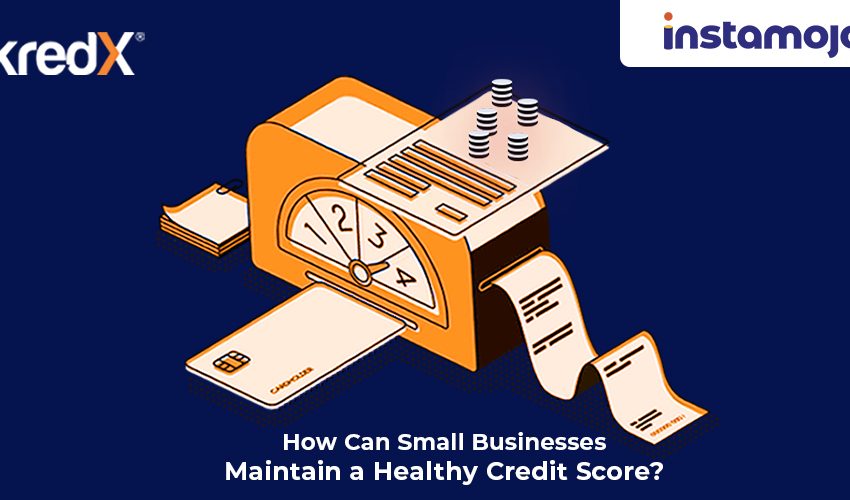
How Can Small Businesses Maintain a Healthy Credit Score?
Do you run your own small business? If so, do you have a healthy credit score? Better get your accounts out, and find out.
It is pivotal for small businesses to maintain a healthy credit score throughout their business life cycle. Small businesses use credit to run daily operations. Even if you operate a home business, you will need a credit card or loan to launch your business effectively. In short, all small businesses must maintain a good credit score. This especially becomes vital when applying for a long term loan for your business. Over 87% of small businesses get credit approval, but maintaining it becomes challenging.
Although building credit for any business is a slow process if done right it can help your business accelerate its growth. A good credit history is an indication of your past purchasing behavior. Therefore, it is advisable to follow these quick simple strategies to build and maintain a healthy credit score.
Own a Business Credit Card
It is advisable for small businesses to meet their daily expenses with a business credit card instead of using personal credit cards. This is especially useful when it comes to making big purchases like office equipment, large shipments, and travel expenses. Credit cards used solely for business can help boost your business’s credit score. Credit experts often recommend taking a business credit card that particularly suits your daily business needs. If your company has recurring payments or small expenses, it is best to own a business credit card to pay them off quickly. A business credit card is an excellent option for recurring or minor expenses that can be paid off quickly.
Consistent, Timely Payments
Business credit is different from your personal credit score. Do not co-mingle the two. Business credit works on 3 core principles:
- Timely payment of bills
- Utilizing credit ratios
- Consistent use of credit in the long run.
Once you launch your business, open a business credit line. Use the credit for your business operations only and ensure that you make payments per cycle. This helps accelerate your credit score in a much shorter span of time.
Make Full Payments
When a small business owes credit, it reflects later in the credit history. Small businesses can own multiple business credit cards, but to reflect good credit scores in the future, ensure you have one card that you pay in full at the end of the billing cycle. Having at least one card that falls back to a zero balance at the end of the month helps accelerate your credit score.
Pay Suppliers on Time
Credit agencies get information on late payers, so if you run a small business and pay suppliers on a credit basis, make sure you pay them on time and in full. With regard to keeping a healthy credit score, it is okay to pay your bills, loans and taxes a little later if needed, but do not delay in paying your suppliers. Late or missing payments eventually show up on your business credit score. Suppliers play a crucial role in the financial health of your business. Late payments are a red flag for business lenders.
Apply for Trade Credit
If paying suppliers in bulk prove tedious in some business cycles, you can boost your credit score by applying for trade credit. With this type of credit, you can get an interest-free grace period before paying for goods and services provided by the supplier. The typical 30-day payment term seen on many business invoices is a form of trade credit.
When small businesses apply for trade credit, there’s leeway for additional cash flow in the company and you can offset payments too. With an arrangement that complies with the supplier, credit agencies receive a healthy and positive report when reviewing the credit score of your company.
Avoid Closing Accounts
It is good to have a credit card with a zero balance at the end of the billing cycle. However, if you close an active account simply due to the completion of payments, this could affect your credit score. Canceling your credit account after spending a few years to pay off card balances is common with small businesses. But it is advised not to do the same. Closing accounts abruptly will have an impact on your credit score and could limit your credit balance in the future.
Monitor your Credit Report
If you are a first-time business credit user, educate yourself on the terms and conditions before applying for one. Before working on building a good credit score, you need to know what it means. Download a copy of your credit report (personal credit) and view transactions. Understand the different interest rates that could be charged on your business credit card and learn about the points, discounts and offers you can use with your credit card. This helps cut costs for your business too. Many business credit cards provide discounts on gas, flight bookings or purchases of electronics.
With these 7 tips set in motion, it becomes easier for a small business to apply for loans that will help meet larger business requirements. Credit works well in the short run, and a good credit score helps avail the long term benefits of getting funds, loans and well, more credit balance.




